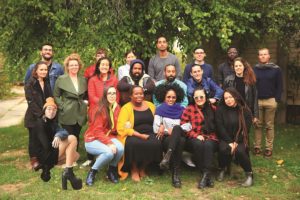PROVINCETOWN — This should have been a banner year for the Fine Arts Work Center, one of the town’s most important cultural institutions, with its faculty of renowned writers and artists and board filled with prominent philanthropists. It began last fall under a new executive director with impressive credentials, including high-level fundraising at M.I.T., and with a cohort of 20 new arts fellows notable for its diversity.
Now, the Work Center is reeling not only from the cancellation of its entire summer program because of the coronavirus but also from accusations of discriminatory treatment, including racism, sexism, classism, transphobia, and general insensitivity. The visual arts coordinator resigned in protest. And the board has responded with an apology and promises to do better.
“The FAWC as an institution has been complicit with the structural racism that plagues our country,” the board writes in a letter posted on its website this week. “We deeply apologize for failures to support fellows, students, and staff (especially black, Indigenous and people of color fellows, students and staff).”
At the same time, it appears that some of the issues raised by the unhappy fellows have been festering for years because of strained relations with FAWC’s neighbors. It is not clear whether these issues are rooted in racism.

Hurt feelings on both sides have unleashed a torrent of accusations and counterclaims, revealing how the seven-month residency where artists have retreated to work quietly since 1968 has not been peaceful this year.
The only fellow who would speak on the record about any of the accusations being circulated anonymously, writer Kevin Fitchett, said the FAWC staff are “not evil racist people.” The issue, he said, is that “America is a racist place, and they were complacent.”
The police responded to four noise complaints in the fall, according to Police Chief Jim Golden. Neighbors were calling the police for trivial reasons, said Fitchett, including, in one case, fellows congregating to watch the sunset on a flat roof.
Tom Thompson, a neighbor who has been accused of harassing the fellows, refused to comment.
The FAWC fellows led off a long list of complaints sent on June 8 to trustees and the Work Center staff with the neighbors’ actions. The accusations included “failing to be present for, intervene in, mediate or protect fellows against policing and a frequent police presence on property as weaponized by the neighbors, even after multiple appeals and pleas by fellows to take tangible actions….”
Another set of complaints related to fellows’ requests to stay on the FAWC campus after their fellowships ended in April. Executive Director Richard MacMillan had already allowed them to stay six extra weeks until June 15. But five fellows, Autumn Wallace, Hanna Pylvainen, Esther Lin, Akiko Jackson, and Fitchett, still needed housing, they said.
MacMillan denied the extension. Some of the five had left by June 15, but at least one remained. That fellow, who asked not to be named, cited Gov. Charlie Baker’s emergency order banning evictions during the coronavirus pandemic.
Another of the charges in the June 8 letter is that Lydia Hicks, the visual arts coordinator, resigned because of discrimination. She was the only staff person of color at FAWC, the letter states.
When asked for examples of racist and discriminatory behavior that led to her resignation, Hicks responded, “In introducing the fellows to the trustees last fall, Bert Yarborough [a trustee] inaccurately said that Antonius [Bui] was from Vietnam. In the same presentation, Bert mixed up Anina Major with Autumn Wallace. Anina is a sculptor from the Bahamas, Autumn is a painter from Philadelphia; they were our only two black femme visual artists this year. Antonius is not from Vietnam, they were born and raised in America. Bert also consistently misgendered Antonius [who uses ‘they’], and when Bert did remember to use appropriate pronouns it was often with an exasperated ‘theeey.’ ”
Hicks also cited MacMillan’s connection to the M.I.T. scandal involving large donations from Jeffrey Epstein, the financier and convicted sex offender, who had been officially disqualified as a donor. Joi Ito, M.I.T.’s Media Lab director, resigned after the New Yorker revealed how he and others knowingly accepted Epstein’s money anyway.
MacMillan worked at M.I.T. for 11 years before being hired by FAWC in March 2019.
On June 15, FAWC submitted a full-page ad to the Independent, for publication in this week’s edition, titled “An Open Letter to Our Community and Our Provincetown Neighbors.” Because MacMillan refused to answer questions about the letter, or to speak to a reporter under any circumstances, publisher Teresa Parker rejected the FAWC ad.
Late Tuesday, MacMillan did finally respond to questions about his involvement in the Epstein affair at M.I.T. The university hired a law firm to conduct a formal review of Epstein’s donations, he said. In its final report, MacMillan said, “I was not mentioned.”
The FAWC board’s apology letter lists specific actions, such as formation of a “fellows council” of the board of trustees to hear grievances, and says FAWC will develop protocols for how the Work Center responds to interactions with local law enforcement. It also vows to expand diversity on the board of trustees, especially regarding genderfluid communities, people of color, and low-income members of the community.
FAWC board president Marty Davis did not respond to requests for comment. But Davis’s wife, Alix Ritchie, defended FAWC’s record on discrimination, saying, “Provincetown is a very white-bread place. But as hard as you work, you’re never perfect and that’s my sense —
they are committed to doing a better job.”
Fitchett said the board’s letter sounded good, but that, in his experience, the FAWC staff has made promises like that before and not followed through.
“It’s really about structure and complacency,” he said.



